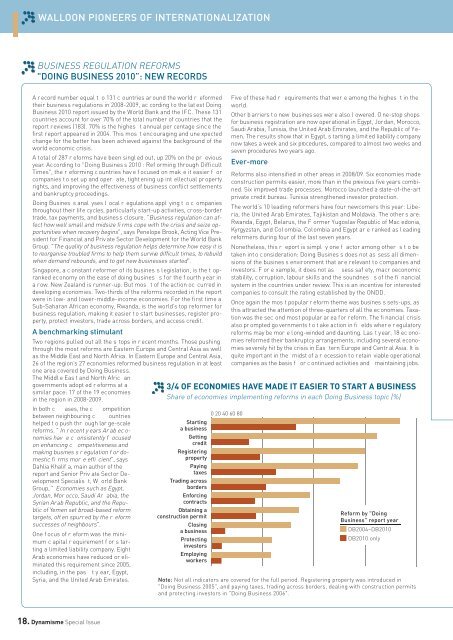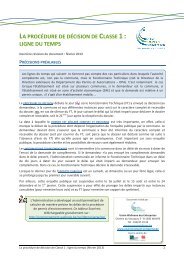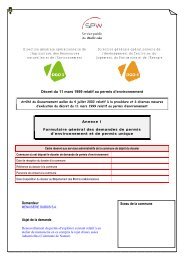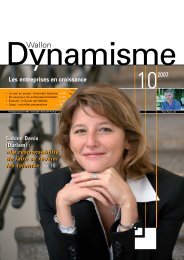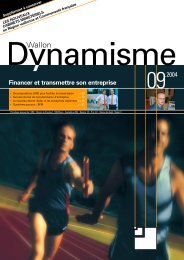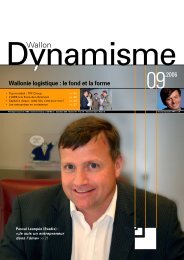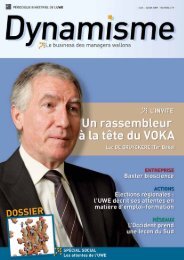EC_Abonnement_soyez de ceux qui_A4.qxp - Union Wallonne des ...
EC_Abonnement_soyez de ceux qui_A4.qxp - Union Wallonne des ...
EC_Abonnement_soyez de ceux qui_A4.qxp - Union Wallonne des ...
You also want an ePaper? Increase the reach of your titles
YUMPU automatically turns print PDFs into web optimized ePapers that Google loves.
WALLOON PIONEERS OF INTERNATIONALIZATION<br />
BUSINESS REGULATION REFORMS<br />
"DOING BUSINESS 2010”: NEW R<strong>EC</strong>ORDS<br />
A r ecord number equal t o 131 c ountries ar ound the world r eformed<br />
their business regulations in 2008-2009, ac cording to the lat est Doing<br />
Business 2010 report issued by the World Bank and the IFC. These 131<br />
countries account for over 70% of the total number of countries that the<br />
report reviews (183). 70% is the highes t annual per centage since the<br />
first report appeared in 2004. This mos t encouraging and une xpected<br />
change for the better has been achieved against the background of the<br />
world economic crisis.<br />
A total of 287 r eforms have been singl ed out, up 20% on the pr evious<br />
year. According to "Doing Busines s 2010 : Ref orming through Diffi cult<br />
Times", the r eforming c ountries hav e f ocused on mak e it easier f or<br />
companies t o set up and oper ate, tight ening up int ellectual pr operty<br />
rights, and improving the effectiveness of business conflict settlements<br />
and bankruptcy proceedings.<br />
Doing Busines s anal yses l ocal r egulations appl ying t o c ompanies<br />
throughout their life cycles, particularly start-up activities, cross-bor<strong>de</strong>r<br />
tra<strong>de</strong>, tax payments, and business closure. "Business regulation can affect<br />
how well small and midsize fi rms cope with the crisis and seize opportunities<br />
when recovery begins", says Penelope Brook, Acting Vice Presi<strong>de</strong>nt<br />
for Financial and Priv ate Sector Development for the World Bank<br />
Group. "The quality of business regulation helps <strong>de</strong>termine how easy it is<br />
to reorganise troubled firms to help them survive difficult times, to rebuild<br />
when <strong>de</strong>mand rebounds, and to get new businesses started".<br />
Singapore, a c onstant reformer of its busines s legislation, is the t opranked<br />
economy on the ease of doing busines s for the f ourth year in<br />
a row. New Zealand is runner-up. But mos t of the action oc curred in<br />
<strong>de</strong>veloping economies. Two-thirds of the reforms recor<strong>de</strong>d in the report<br />
were in low- and lower-middle-income economies. For the fi rst time a<br />
Sub-Saharan African economy, Rwanda, is the world’s top reformer for<br />
business regulation, making it easier t o start businesses, register property,<br />
protect investors, tra<strong>de</strong> across bor<strong>de</strong>rs, and access credit.<br />
A benchmarking stimulant<br />
Two regions pulled out all the s tops in r ecent months. Those pushing<br />
through the most reforms are Eastern Europe and Central Asia as well<br />
as the Middle East and North Africa. In Eastern Europe and Central Asia,<br />
26 of the region’s 27 economies reformed business regulation in at least<br />
one area covered by Doing Business.<br />
The Middl e Eas t and North Afric an<br />
governments adopt ed r eforms at a<br />
similar pace: 17 of the 19 economies<br />
in the region in 2008-2009.<br />
In both c ases, the c ompetition<br />
between neighbouring c ountries<br />
helped t o push thr ough lar ge-scale<br />
reforms. " In r ecent y ears Ar ab ec o-<br />
nomies hav e c onsistently f ocused<br />
on enhancing c ompetitiveness and<br />
making busines s r egulation f or domestic<br />
fi rms mor e effi cient", says<br />
Dahlia Khalif a, main author of the<br />
report and Senior Priv ate Sector Development<br />
Specialis t, W orld Bank<br />
Group, " Economies such as Egypt,<br />
Jordan, Mor occo, Saudi Ar abia, the<br />
Syrian Arab Republic, and the Republic<br />
of Yemen set broad-based reform<br />
targets, oft en spurred by the r eform<br />
successes of neighbours".<br />
One f ocus of r eform was the minimum<br />
c apital r e<strong>qui</strong>rement f or s tarting<br />
a limited liability company. Eight<br />
Arab economies have reduced or eliminated<br />
this re<strong>qui</strong>rement since 2005,<br />
including, in the pas t y ear, Egypt,<br />
Syria, and the United Arab Emirates.<br />
0 20 40 60 80<br />
Starting<br />
a business<br />
Getting<br />
credit<br />
Registering<br />
property<br />
Paying<br />
taxes<br />
Trading across<br />
bor<strong>de</strong>rs<br />
Enforcing<br />
contracts<br />
Obtaining a<br />
construction permit<br />
Closing<br />
a business<br />
Protecting<br />
investors<br />
Employing<br />
workers<br />
Five of these had r e<strong>qui</strong>rements that wer e among the highes t in the<br />
world.<br />
Other b arriers t o new busines ses wer e also l owered. O ne-stop shops<br />
for business registration are now operational in Egypt, Jordan, Morocco,<br />
Saudi Arabia, Tunisia, the United Arab Emirates, and the Republic of Yemen.<br />
The results show that in Egypt, s tarting a limited liability company<br />
now takes a week and six procedures, compared to almost two weeks and<br />
seven procedures two years ago.<br />
Ever-more<br />
Reforms also intensified in other areas in 2008/09. Six economies ma<strong>de</strong><br />
construction permits easier, more than in the previous five years combined.<br />
Six improved tra<strong>de</strong> processes. Morocco launched a state-of-the-art<br />
private credit bureau. Tunisia strengthened investor protection.<br />
The world’s 10 leading reformers have four newcomers this year: Liberia,<br />
the United Arab Emirates, Tajikistan and Moldavia. The other s are:<br />
Rwanda, Egypt, Belarus, the F ormer Yugoslav Republic of Mac edonia,<br />
Kyrgyzstan, and Col ombia. Colombia and Egypt ar e ranked as l eading<br />
reformers during four of the last seven years.<br />
Nonetheless, this r eport is simpl y one f actor among other s t o be<br />
taken int o consi<strong>de</strong>ration: Doing Busines s does not as sess all dimensions<br />
of the busines s environment that are relevant to companies and<br />
investors. F or e xample, it does not as sess saf ety, macr oeconomic<br />
stability, c orruption, labour skills and the soundnes s of the fi nancial<br />
system in the countries un<strong>de</strong>r review. This is an incentive for interested<br />
companies to consult the rating established by the ONDD.<br />
Once again the mos t popular r eform theme was busines s sets-ups, as<br />
this attracted the attention of three-quarters of all the economies. Taxation<br />
was the sec ond most popular ar ea for reform. The fi nancial crisis<br />
also pr ompted go vernments t o t ake action in fi elds wher e r egulatory<br />
reforms may be mor e long-win<strong>de</strong>d and daunting. Las t year, 18 ec onomies<br />
reformed their bankruptcy arrangements, including several economies<br />
severely hit by the crisis in Eas tern Europe and Centr al Asia. It is<br />
<strong>qui</strong>te important in the midst of a r ecession to retain viable operational<br />
companies as the basis f or c ontinued activities and maintaining jobs.<br />
3/4 OF <strong>EC</strong>ONOMIES HAVE MADE IT EASIER TO START A BUSINESS<br />
Share of economies implementing reforms in each Doing Business topic (%)<br />
Reform by "Doing<br />
Business" report year<br />
DB2004–DB2010<br />
DB2010 only<br />
Note: Not all indicators are covered for the full period. Registering property was introduced in<br />
"Doing Business 2005", and paying taxes, trading across bor<strong>de</strong>rs, <strong>de</strong>aling with construction permits<br />
and protecting investors in "Doing Business 2006".<br />
18. Dynamisme Special Issue


